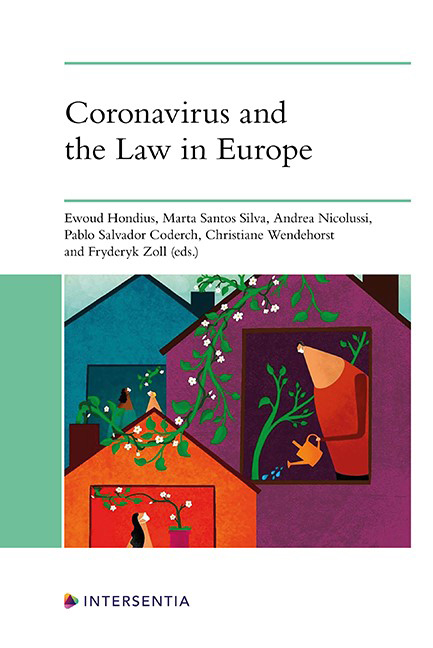Book contents
- Frontmatter
- Preface
- Contents
- List of Keywords
- List of Contributors
- PART I COVID-19 AND FUNDAMENTAL RIGHTS
- PART II STATES AGAINST THE PANDEMIC
- PART III COMPENSATION FOR COVID-19 RELATED DAMAGE
- PART IV CONTRACT LAW
- PART V CONSUMER LAW
- PART VI LABOUR AND SOCIAL LAW
- PART VII CORONAVIRUS CHANGING EUROPE
- Epilogue
- Annex: ELI Principles for the COVID-19 Crisis
- About the Editors
Hard Choices in the Pandemic and Guidelines: Ethical and Juridical Remarks on Medical Responsibility and Liability
Published online by Cambridge University Press: 10 December 2021
- Frontmatter
- Preface
- Contents
- List of Keywords
- List of Contributors
- PART I COVID-19 AND FUNDAMENTAL RIGHTS
- PART II STATES AGAINST THE PANDEMIC
- PART III COMPENSATION FOR COVID-19 RELATED DAMAGE
- PART IV CONTRACT LAW
- PART V CONSUMER LAW
- PART VI LABOUR AND SOCIAL LAW
- PART VII CORONAVIRUS CHANGING EUROPE
- Epilogue
- Annex: ELI Principles for the COVID-19 Crisis
- About the Editors
Summary
This contribution proposes some legal and ethical considerations on the relationship between medical responsibility (also in the sense of medical liability) and guidelines, which over time have earned particular relevance in many legal systems. The pandemic situation has made this issue even more difficult as, on the one hand, there were no concrete guidelines and, on the other hand, several recommendations of various kinds and origins have spread, leading to confusion among healthcare professionals. In particular, the ethical-clinical recommendations developed by the Italian Society of Anaesthesia, Analgesia, Resuscitation and Intensive Care (SIAARTI) has produced an intense debate not only in Italy but also abroad; indeed, SIAARTI recommendations have encouraged the publication of recommendations on the same subject in many other countries. This contribution deals with the most relevant recommendations, but mainly focuses on the Italian document since it can be considered the model for other documents. Furthermore, the restriction on access to intensive care that is based, a priori, on age raises questions concerning not only its ethical legitimacy but also the competence of a scientific society in providing rules that may seriously infringe fundamental rights. The contribution criticises this a priori and extra-clinical criterion and proposes, in turn, an integrated clinical criterion, which can deal with situations of the state of emergency and the lack of resources. This integrated criterion would be more respectful of the physicians’ competences and would enhance their professional role, without invading the scope and competence of the democratic institutions.
THE LESSON OF THE PANDEMIC: THE IMPORTANCE OF A SYSTEMATIC APPROACH FOR HEALTHCARE ORGANISATIONS
The COVID-19 pandemic has highlighted the need to reconsider healthcare organisation in its various aspects. In particular, it has shown how important it is, on the one hand, to rebalance the relationship between the individual (not to say individualistic) dimension of health and the collective or solidarity dimension, and, on the other hand, to have a systemic vision in which to organise healthcare activities. From the perspective of the Italian Constitution, it has been an opportunity to rediscover Article 32 of the Constitution, i.e. the connection and complementarity of health both as a fundamental right of the individual and in the interest of the collectivity; this is also in line with the solidarity framework of the defined Ethical and Social Relations (Rapporti etico-sociali) in which the protection of health is placed.
- Type
- Chapter
- Information
- Coronavirus and the Law in Europe , pp. 411 - 438Publisher: IntersentiaPrint publication year: 2021



